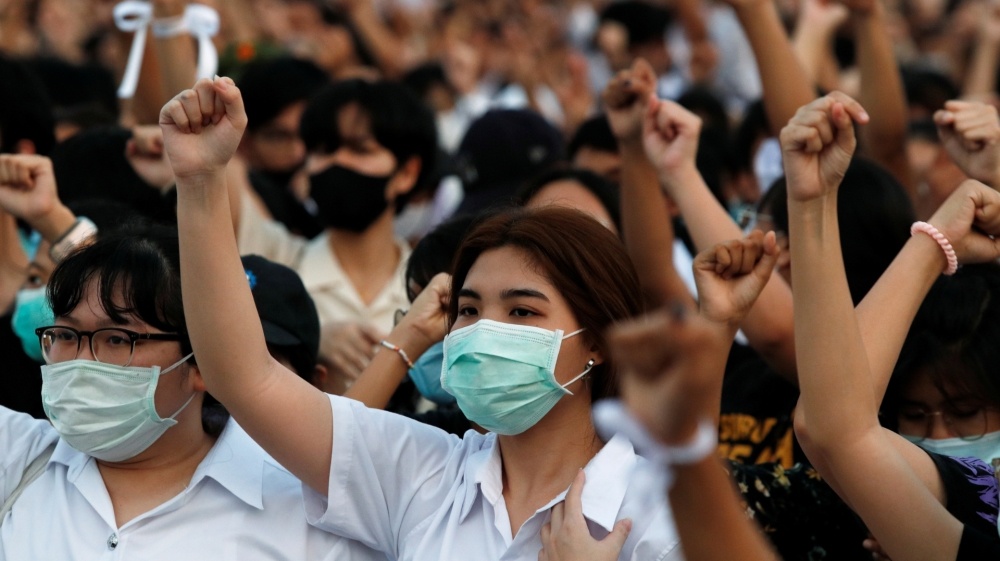Students in Thailand have been dodging pepper spray, putting out tear gas canisters and holding up three-finger salutes as they call for major democratic reforms to the Prayut Chan-o-cha government as well as a modernisation of the monarchy.
On November 8, tens of thousands of pro-democracy protesters attempted to reach Bangkok’s Grand Palace to hand-deliver letters addressed to the country’s King, Maha Vajiralongkorn.
“It does not matter whether the people love the king or not, he must love them all the same. If the king can talk to the people who love him, he must also talk to the people who do not all the same,” one said. It ended with “with power of equal human dignity” and a signature of “people”.
In response to the demonstrators, the police fired water cannons at the crowds, which sparked a major outcry amongst local activists against what they deem “the use of excessive force”. The blasts of blue-coloured water were employed to mark protesters who then could be easily identified and arrested.
It all started with peaceful demonstrations on university campuses at the start of 2020 in response to a court decision to dissolve the Future Forward Party (FFP), a progressive opposition party – popular amongst young people. Thailand’s Constitutional Court’s order to the party’s dissolution curbed its ability to run for the general election – the first election they were eligible to participate in after the 2014 military coup d’état, led by their incumbent Prime Minister.
Thai protesters called the FFP’s dissolution their ‘breaking point’ due to their exhausted efforts against the military government’s suppression of democratic rights and the country’s progress.
“Let it end with our generation”, the protesters chanted as they held up the three-finger salute inspired by the dystopian film Hunger Games in which the salute was a rallying symbol of defiance against the regime. The youths of Thailand are fed up with the endless cycle of coups in their country’s history.
They call for the dissolution of Prayuth’s government, reforms of the military-drafted constitution and monarchy – who have been accused of military-backed and political interference – democratic elections and an end to the harassment of peaceful political dissidents.
At present, it is illegal to criticise the monarchy in Thailand as the royal family is protected by a strict yet semantically vague lèse majesté law. Anyone who “defames, insults or threatens the king, queen, heir-apparent or regent” could face a sentence of up to 15 years.
Other than the traditional means of marching and slogan-chanting, the Thai protesters are getting more and more creative. Technically speaking, most are legally constrained to voice their discontent with the current government with connotative and allegorical acts of demonstration, including but not limited to holding one-person readings of the novel “1984” and gathering in public spaces to eat sandwiches.
Still, the most politically vocal student protesters who take on these unorthodox forms of assembly face detainment, criminal proceedings and even prison terms under the vaguely worded security laws of Thailand.
A report “They are always watching”, conducted by Amnesty International, detailed Prayuth’s administration’s efforts to crush online critics of the government and the monarchy. In August this year, Facebook announced that it had complied with the Thai government’s demands to geo-block and censor political content. Authorities have also attempted to shut down Telegram, a protest-organizers-favourite messaging app and social media channels of activist groups, such as the Free Youth Movement, with the Computer Crime Act.
The use of water cannons faced online disapproval and they are not unfounded. Protesters said the coloured-water contained chemical irritants, which could pose serious injuries. The indiscriminate use of dye could easily lead to the arbitrary targeting and arrests of passers-by and journalists.
Amnesty International is calling on Prayuth’s administration to “drop unjustified charges and release peaceful protesters” and has denounced their tactics in response to protesters as breaches of the 1948 Universal Declaration of Human Rights, in which the rights to freedom of expression, peaceful assembly and association are enshrined.
With 84 people charged since October 13 and at least 173 individuals arrested since the beginning of 2020 on “vague and politically motivated charges”, the Thai military government is grossly violating universal human rights and employing these “baseless criminal proceedings” as intimidation tactics to silence democratic activists.
As several human rights groups like Thai Lawyers for Human Rights and Article 19 have said, General Prayuth should fulfil his obligations under international human rights law by refraining from using excessive force against demonstrators and cultivating an environment where Thai people can freely exercise their basic rights to freedom of expression and peaceful assembly without fear or interference.
We live in a world where values of democracy, freedom and universal human rights are valued and upheld. The international community should assemble as an alliance to support Thai people’s struggles to make their voice heard without prosecution and pressure the country’s military government from suppressing activists and protesters and to listen to its people’s demands.
Clarissa Leung
Featured Image source: Al Jazeera

